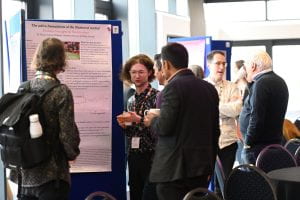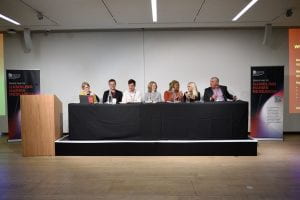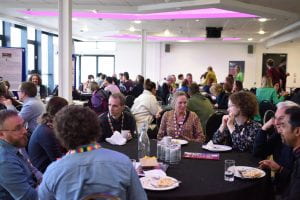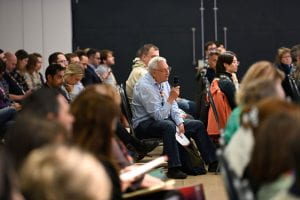By Adrianna Jezierska, PhD researcher at University of Bristol Business School

The Bristol Hub for Gambling Harms Research held its second colloquium on 10th October 2024. After the success of last year’s event on capacity building in gambling harms research, this year focused on International Challenges in Gambling Harms Research. And it was a truly international gathering with 150 attendees from 10 nations comprising research experts, individuals with lived experience, government bodies, regulators and political commentators.
From the moment the event opened, there was a clear sense of international urgency. Agnes Nairn and Sharon Collard, the Hub’s Co-Directors, set the tone in their welcome speech, reminding everyone that gambling is a global enterprise, and its harms are felt across the world.

This international perspective was echoed throughout the day, starting with a compelling keynote speech from Brianne Doura-Schawohl, a leading voice in gambling policy reform in the US. She offered a fascinating look at the cultural and legislative landscape in the United States, where gambling has deep historical roots and is tightly woven into the fabric of American culture – especially through sports. Just think of the Super Bowl, where a staggering 67.8 million Americans place bets each year. Brianne also highlighted the important role of college sports, likening it to a religion for many, and suddenly, it all made sense to me. I realised how much this had shaped the basketball shows my younger brother and I watched on Netflix – most of the NBA players would play basketball in the basketball college league, something I had never experienced as a student in Europe.
Throughout the day, alongside the sessions, participants could gather around over 20 research posters on a wide range of topics presented by early-career academics and awardees of the Hub Research Innovation Fund, among others.
Session 1: Sports and gambling
Simon Chadwick offered a brief overview of sports sponsorship and its ecosystem in the leading sports events, such as the UEFA Champions League. As he rightly pointed out, sponsorship is no longer simply about finances. Gambling companies increasingly support local communities by financing male and female football clubs and charity-giving to academic institutions, demonstrating how these deals can make an uneasy mix of philanthropic efforts and business transactions.
This normalisation effect was also highlighted by Maria Moxey, a researcher at the University of Bristol. She discussed the numbers of gambling ads in the opening weekend of Premier League football. In 2023, there were just under 11,000 gambling advertisements across televised football matches, sports news programming, radio and social media. That number skyrocketed to 30,000 in 2024. Despite the so-called ‘whistle-to-whistle’ ban, which stops the broadcasting of gambling adverts five minutes before and after the live sports event, gambling adverts are still present. The self-regulatory gambling advertising regime in GB is clearly not working.
Carolyn Plateau, from the University of Loughborough, is one of the Research Innovation Hub awardees. The connection between gambling and cricket is less researched, but her work suggests that players are not immune to gambling. For example, cricketer Chris Wood has shared how gambling became a coping mechanism to manage emotions tied to his performance.
Finally, Tobias Scholz from the University of Agder in Norway drew on yet another area of sports thus far neglected by governments: esports. As digital arenas are growing in popularity, there is an expanding marketplace for businesses, including gambling operators. Tobias highlighted that despite the interest in legislating gambling in elite sports, the approach is fragmented and lags behind the increasing popularity of esports.
Session 2: Living with gambling harms

With our understanding of the changing landscape of sports and gambling enhanced, we moved on to a conversation with Julie Martin and Matt Losing. This session differed from any other panel during the colloquium. The word ‘touching’ was probably the most used after this conversation. Facilitated by Ali Vowles, an ex-BBC Reporter and Presenter, attendees got to hear live experiences of people affected by gambling harms. I could see how quickly the interview changed the mood in the room.
Julie recounted personal stories of how her partner’s decade-long gambling addiction led to his tragic suicide, leaving her and her family with deep emotional trauma. Matt, who formerly served in the British Navy, developed a gambling addiction after being exposed to casinos in ports around the world. His addiction worsened after leaving the Navy, when online gambling became more accessible to him.
The anchoring point of their stories was the immense value of the support provided by lived experience groups that help people who experience harm from gambling. Julie and Matt actively support these causes. Julie is the Aftercare Co-ordinator at BetKnowMoreUK, a charity established by individuals with lived experience. Matt works as the Armed Forces project lead at Ara Recovery For All, a Bristol-based charity that supports people affected by gambling harms, mental health issues and addiction.
Session 3: Cryptocurrency, illegal gambling and gambling-like activities

If the colloquium had a sub-theme, I am sure it would be something around the digitalisation of gambling. This session, describing various digital challenges for regulating gambling activities, started after a lunch break, where we had a chance to mingle, digest the morning sessions, and chat with the poster presenters.
Sanya Burgess, a journalist with The i newspaper, discussed her investigative work into the rise of crypto casinos and gambling influencers, highlighting how these creators use fun, neon-coloured videos and celebrity imagery to promote unregulated crypto casinos. Unlike traditional casinos, crypto casinos allow anonymous, high-stakes betting with no limits or regulations, making them particularly harmful. Streamers often receive sponsorships from casinos, where their earnings increase as their followers lose more money. This lack of transparency encourages harmful gambling behaviour. Some influencers, driven by these deals, developed their own gambling addictions, with several reporting lost income, suicidal thoughts, and contracts being cancelled after their streams promoted risky betting habits.
The University of Bristol’s Philip Newall discussed some of his new research about the gamblification of investing. The work started by drawing similarities between gambling and investing to the extent that they both include risky use of money. Although people in general perceive investing as less risky than gambling, gamblified investment products attract individuals to participate in high-frequency stock trading, or use design principles from gambling, such as encouraging frequent use or offering the allure of big, lottery-like wins. The gamblification of investing presents additional challenges for regulating financial markets and gambling as it blurs the lines between the two activities.
Elena Petrovskaya from the University of Lincoln highlighted the fragmented regulation around loot box advertising. Loot boxes appear in video games, promoting the chance to win enhancements to performance in the game. More specifically, she discussed the case study of the Netherlands and Belgium, two European Union states that have adopted some form of loot box regulation. Loot boxes have drawn criticism for targeting younger or vulnerable players by making them seem like a fun or easy way to enhance the gaming experience while downplaying the gambling-like nature of the transactions.
Simon Ellis, from HMRC’s investigation team, discussed the organisation’s efforts to combat financial crimes like money laundering, a top priority for the team. He shared examples of fraud, including individuals submitting false tax declarations and organised crime groups smuggling tobacco and cigarettes with the proceeds laundered by placing large bets at local gambling venues. Such sophisticated schemes harm society by reducing tax revenue for essential services and operating outside traditional banking systems, making them harder to detect.
Session 4: International and Interdisciplinary perspectives panel presentations and discussion
The final session of the colloquium wrapped up some of the key themes from discussions throughout the day. Andrea Czako, from the University of Gibraltar and Selma Ilonga, from the University of Namibia, both awardees of the Research Innovation Fund, provided initial findings of their international projects. Andrea’s focus is on the public perception of gambling and gambling disorder. Probably the most staggering number from her presentation was that 47.5% of people would reject a friendship with someone who has a gambling problem. On the other hand, Selma provided a brief overview of the gambling legislation in Namibia that came into force in 2021. Despite the adoption of the Act, there is growing gambling advertising promotion across the country. The team of researchers led by Selma is investigating the promotional communication and materials used to influence gambling activities in a country that grapples with poverty and unemployment. Both presentations provided a unique understanding of the cultural dimensions of gambling across the globe.
Kate Bedford from the University of Birmingham and Ben Haden from the Gambling Commission and President of the International Association of Gaming Regulators (IAGR) put forward this key message: in this fast-changing area, there is a need for good data and evidence to help minimise the risk and harms associated with gambling. In her presentation on the need for interdisciplinarity in gambling harms research, Kate referred to the fragmented conversations about legislation. While some countries adopt laws, we do not have a robust understanding of, nor evidence about, what regulation works best. Legal interventions designed with one group in mind can make things worse for other groups, making the case for a stronger interdisciplinarity in gambling research. In a similar vein, Ben presented the ongoing work by the IAGR, strengthening the available data and making them more widely available for researchers and interest groups that can influence decision-making, ultimately leading to a better understanding of what regulatory changes are necessary.
Looking ahead to the third colloquium in 2025
As the day drew to a close, it was clear that the colloquium set the stage for what is both achievable and necessary. With growing global and cross-disciplinary interests, participants fostered rich dialogue during the day. One participant remarked, “An amazing array of information and knowledge. It’s encouraging to see so much hard work being done.” Another added, “The posters covered a wide range of topics and sparked some fascinating discussions.”
This sense of collaboration was widely appreciated, with attendees emphasising the welcoming tone and balanced mix of lived experiences alongside professional expertise “The tone of the event was very welcoming and the mix of lived experience and various other types of expertise was good”.
It was exciting to observe such a dynamic exchange of ideas and a growing collective commitment to reforming the gambling industry. I look forward to next year’s event, where this momentum will surely continue to grow.













